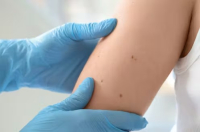
H. Peter Soyer
Professor of Dermatology, The University of Queensland
Professor H. Peter Soyer has a dual academic/clinical role as the inaugural Chair and Director of the Dermatology Research Centre, The University of Queensland (UQ) Diamantina Institute, at the Translational Research Institute, and as Director of the Dermatology Department at the Princess Alexandra Hospital in Brisbane.
Professor Soyer, an academic dermatologist from Austria, is a world leader in the field of dermatology with particular expertise in preventative dermatooncology and dermatologic imaging. His research group’s main focus is skin cancer (both melanoma and keratinocyte skin cancer) and he is co-inventor in patents for novel skin delivery platforms and microbiospy sampling devices. He has an extensive publication record with over 500 publications (>120 publications in the last 5 years), over 650 citations a year and a Hirsch index of 50 (Researcher ID).
He initiated establishment (2016) and is Co-leader of the Australian Skin and Skin Cancer (ASSC) Research Centre, a joint venture between UQ and QIMR Berghofer Medical Research Institute. He was Co-President of the 9th World Congress of Melanoma, Brisbane, Australia, 2017. He is lead investigator of the Centre of Research Excellence for the Study of Naevi funded by the Australian Government National Health and Medical Research Council (NHMRC), a Queensland Genomics Health Alliance Demonstration Project ‘A Genomics Approach for Screening of Patients at High Risk of Melanoma’, and a UQ Faculty of Medicine Health Outcome Program ‘3D QMelanoma – Targeted Early Detection of Melanoma Utilising a 3D Teledermatology Network’.
He was recently awarded a Medical Research Future Fund (MRFF) Next Generation Clinical Researchers Program Practitioner Fellowship (2018-2022).

We don’t all need regular skin cancer screening – but you can know your risk and check yourself
Dec 28, 2024 07:18 am UTC| Insights & Views Health
Australia has one of the highest skin cancer rates globally, with nearly 19,000 Australians diagnosed with invasive melanoma the most lethal type of skin cancer each year. While advanced melanoma can be fatal, it is...

How long does it take for skin to repair after sun exposure?
Jan 25, 2023 04:44 am UTC| Health
Its impossible to avoid the Aussie sun entirely, but Australians are well aware of the dangers of too much exposure. Some 40 years of Slip Slop Slap (and more recently added, Seek and Slide) campaigns have reinforced this,...
- Market Data









































